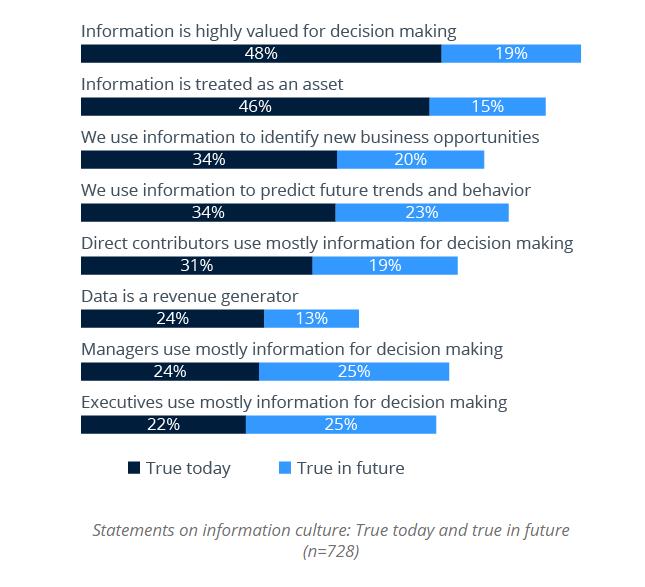In today’s world, data has become an integral part of any business. What does it mean to inculcate a data-driven culture in business? It means to overcome the data-resistant outlook that hinders companies from applying a data-driven approach. It means breaking the stereotype that speaks “we’ve always done it this way.” However, organizations are still exploring ways to benefit from the collective intelligence in the decision-making process.
Here’s the result of a survey on importance of data conducted by BI Survey with 728 companies.

There are companies that see the benefits of data-driven approach to be true in the current scenario while there are other companies that think it is futuristic. If you are one of those companies, let me give you five reasons why now is the time you should embrace data-driven culture.
1. Confidently launch new products and services
Relying on data isn’t exactly an acceptable form of making decisions when it comes to launching new offerings. There is plenty of data available that can help you do so. Your customers have a voice that you need to not only listen to but also record and use to improve your services or products. This is called social listening.
You learn about your customers and the market of your products and services when you listen to what people say or post on social media. With Voice of Customer Analytics (VoC), you get insights into what your audience and target demographic is interested in, excited about, or planning to dump. It also allows you to monitor your competitors and get a better sense of what’s happening in your industry.
This information can help you determine not only whether you should launch something new, but also what types of products and services your customers would like to see. This helps companies to create products that connect with the consumer, provide increased consumer value, and minimize the risks associated with a new product’s launch.
2. Better collaboration
Collaboration is a core tenant of the culture. Companies having an easy access to data save more time in collaborating and sharing reports across organization. This results in improved situational awareness and performance at an individual and team level.
To become a data-driven company, you need to make data collection a primary activity across departments. This gives you the ability to provide real-time insights as to where course correction may be needed or new opportunities seized. Collaboration helps to constantly diagnose exiting systems and processes and based on the discovery, you can transform your business operations. When a business case for change is made – it’s backed by data. Moreover, transparency encourages upward management and communication.
3. Finding and targeting right audience for your products / services
To get insights on what your customers are saying about you, you’ll want to examine your current customer data. But, you should also research about the demographics of your audience in terms of their location or age group.
Business analytics applied on social media analysis combined with internal customer data gives you accurate understanding of your customers. Comparing this demographic target with publicly available census data lets you see even deeper. You can identify where people are most likely to take advantage of your products or services. As a result, you can narrow down the areas that offer the most in terms of expansion and customer potential.
4. Informed decision-making
In highly competitive environments, companies that can quickly adapt and adjust to the market changes are the companies that survive. To be one of those companies, it is essential to make decisions based on facts rather than instincts. To get the full picture, you need a broad understanding of what’s happening in every sector that affects your business.
Data-driven decisions powered by data are increasingly helping companies to stand out from the competition. Analytics running on data has several very practical applications that drive lucrative business results. It helps in defining and measuring KPIs across the organization to achieve savvy decision-making capabilities and align measures of success.
Data gives you answers to questions like:
- What happened?
- Why it happened?
- And what should be the next action to be taken
Data is a strategic asset that powers every major decision made; in a truly data-driven organization, every planned meeting begins with data, and no decision is executed without a governance structure to collect and measure the decision.
5. Cost optimization
Of the Fortune 1,000 companies that use big data, the majority employ it (and see value in its ability) to decrease expenses, according to Harvard Business Review.
By tracking parameters like sales and expenses, you can find patterns like seasonal effect on your sale or in what period of time did you generate the highest sales. This can further help you with informed decisions about various operations like pricing products and services, and where and when to market certain products.
Transform insights into action
The journey of a company to become a data-driven organization begins with entrepreneurial efforts. However, the process requires adoption throughout the organization. Without buy-in at every level, an organization cannot truly become data-driven.
And even if, due to some reasons, an entire company does not become data-driven, you can adopt data-driven practices to improve the part of the organization you have control over.
Companies that have implemented data-driven approach in their business have observed following benefits:
- Get a 360 degree view of people, processes, technology, and governance to plan and execute effective performance management
- Gain insights on the current scenario of your business and foresee what might happen in the future
- Create a data-first culture that thrives on fact-based decisions
- Gain the agility to meet ever-changing regulatory, market, and economic conditions, and gain a competitive edge
At Softweb Solutions, we inculcate a data-approach to reshape the business landscape by implementing digitization, analytics, artificial intelligence, and automation to create performance and productivity opportunities for various industries. With data at the core of our offerings, we inculcate data-driven culture in our client’s business to enable evidence-based decision-making, insight generation, and process optimization.
Take your first step towards your data journey and contact our data experts to guide you further.









